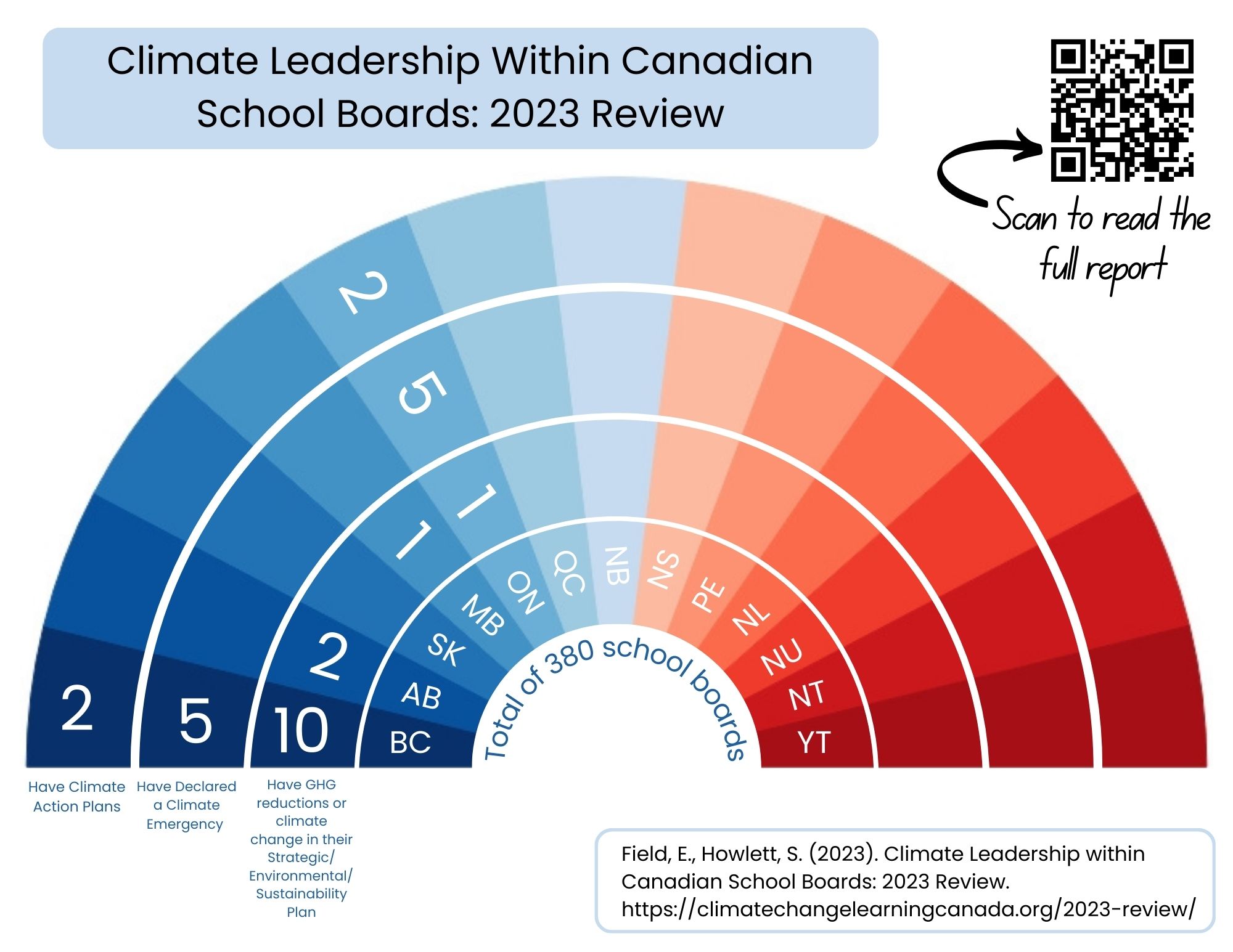Canadian school boards urged to take bold climate action as new report reveals limited progress

November 15, 2023 – Orillia, Ont.
A comprehensive new report from researchers at Lakehead University highlights the need for greater commitment from Canadian school boards to address the climate crisis.
The report, “Climate Leadership Within Canadian School Boards: 2023 Review”, published by Dr. Ellen Field, Assistant Professor in the Faculty of Education, and Sidney Howlett, Master of Education candidate and research analyst, benchmarks climate leadership practices across 380 Canadian school boards through policy indicators such as the existence of Climate Action Plans, climate emergency declarations, and the integration of climate change and greenhouse gas reduction goals into strategic or environmental and sustainability plans.
“School boards are pivotal actors in shaping the educational landscape and inspiring future generations,” explains Field. “The potential impact of school board leadership across all schools in Canada, if greenhouse gas emission targets were set and acted upon in line with the Paris Agreement, could have a ripple effect in reducing emissions and improving climate literacy across Canada.”
Overall, the report reveals a mixed landscape where progress is limited but the potential for impact is immense. Highlights of the findings include:
- Only four school boards in Canada had published Climate Action Plans: Toronto District School Board, Trillium Lakelands District School Board, Richmond School District, and Greater Victoria School District.
- Five school boards have environmental and sustainability plans, and nine have strategic plans that mention climate change or greenhouse gas reductions.
- Only 10 school boards in Canada have declared a climate emergency, all from either British Columbia or Ontario.
- B.C. and Ontario are the only provinces that require some form of mandatory reporting, with variability in ambition and level of detail required by school boards.
“Our research demonstrates that provincial mandates can enhance school boards’ leadership, fostering a more proactive approach to climate action,” Howlett says.
On average, Ontario school boards are aiming for less than two percent annual greenhouse gas reductions, with the most frequent target set at one percent reduction annually. With the current five-year plans ending in 2023, Field and Howlett state that there exists an opportunity to advocate for more ambitious, science-based targets for reducing energy consumption and greenhouse gas emissions in schools across Ontario. Collectively, these boards produce more than 650,000 tonnes of carbon dioxide equivalent annually.
“Our intention with this report is to encourage superintendents and senior leaders of school boards to see their schools as important stakeholders for taking climate action, not only through the energy efficiency of their schools but also as community actors that have climate action plans and are working for more-stable futures in alignment with the Paris agreement,” Field says. “We also recognize that this may mean advocating for provincial or federal funding or mandatory reporting to improve climate governance across the system.”
In addition to the report, Field and Howlett have provided resources for school boards to support the development of climate action plans, including specific examples of school board leadership, a pledge for superintendents to commit to driving climate action within their school boards, and a way for school boards to provide updates on new climate policies.
“In Canada, 492 municipalities have already declared a climate emergency and more than 52 municipalities have climate action plans. The urgency and momentum surrounding climate action is at the regional level. We see opportunity for school boards to work with regional partners to develop climate action plans and implement solutions,” adds Howlett.
The full report is available at https://climatechangelearningcanada.org/.
- 30 –
Media: For more information or interviews, please contact Jaclyn Bucik, Media, Communications and Marketing Associate, at 705-330-4010 ext. 2014 or mediarelations@lakeheadu.ca.
Lakehead University is a fully comprehensive university with approximately 9,700 full-time equivalent students and over 2,000 faculty and staff at two campuses in Orillia and Thunder Bay, Ontario. Lakehead has nine faculties, including Business Administration, Education, Engineering, Graduate Studies, Health & Behavioural Sciences, Law, Natural Resources Management, Science & Environmental Studies, and Social Sciences & Humanities. Lakehead University’s achievements have been recognized nationally and internationally, including being ranked in the top half of Times Higher Education's 2023 World Universities Rankings for the fourth consecutive year, and the number one university in the world with fewer than 9,000 students in THE’s 2023 Impact Rankings (which assesses institutions against the United Nations’ 17 Sustainable Development Goals). Visit www.lakeheadu.ca.

